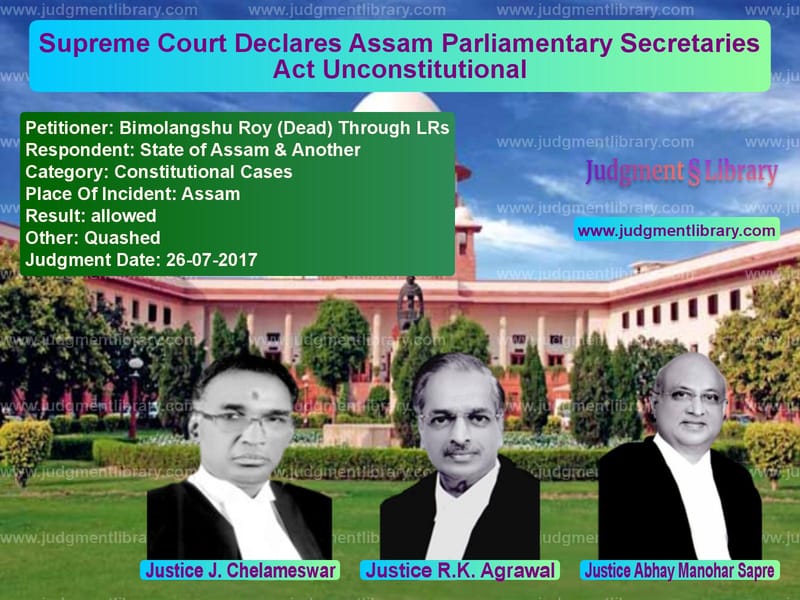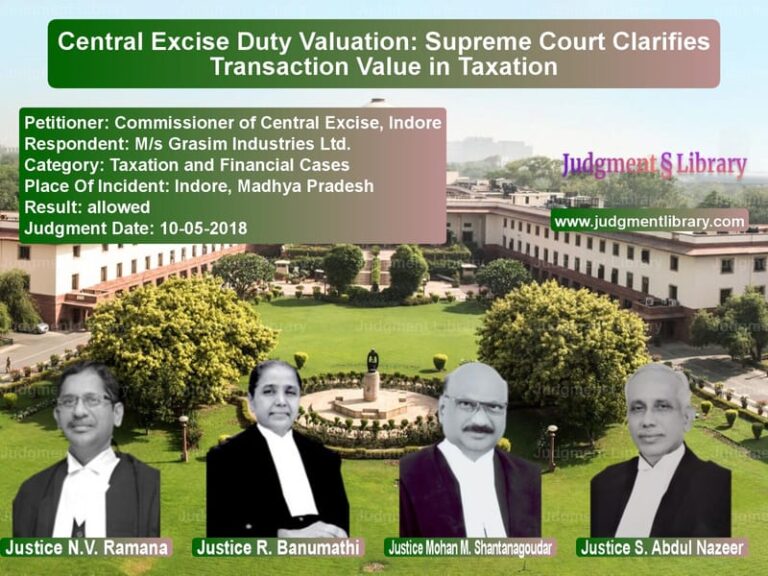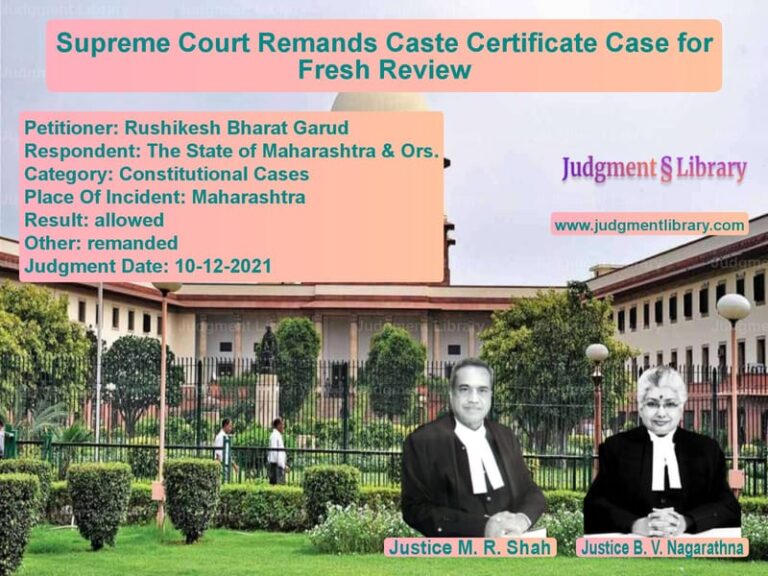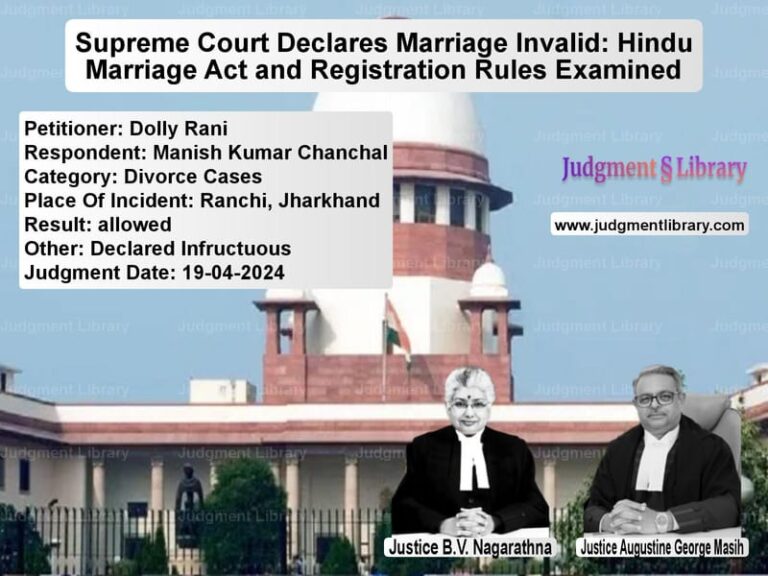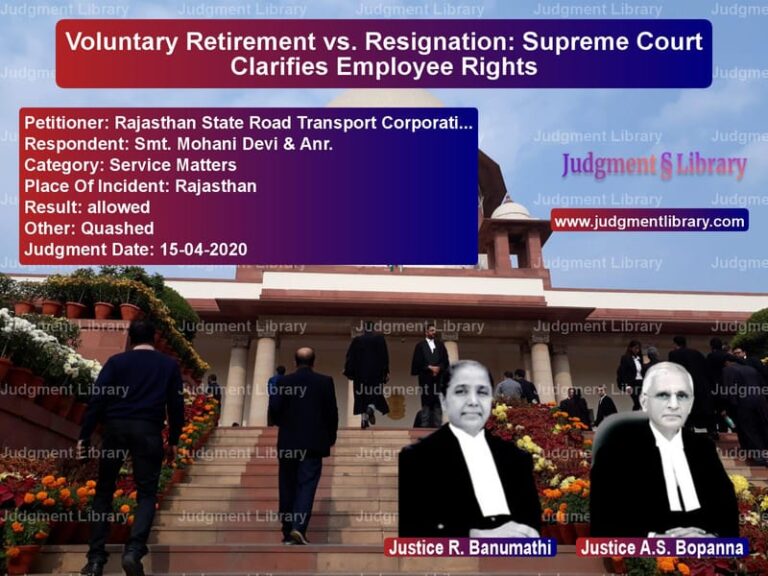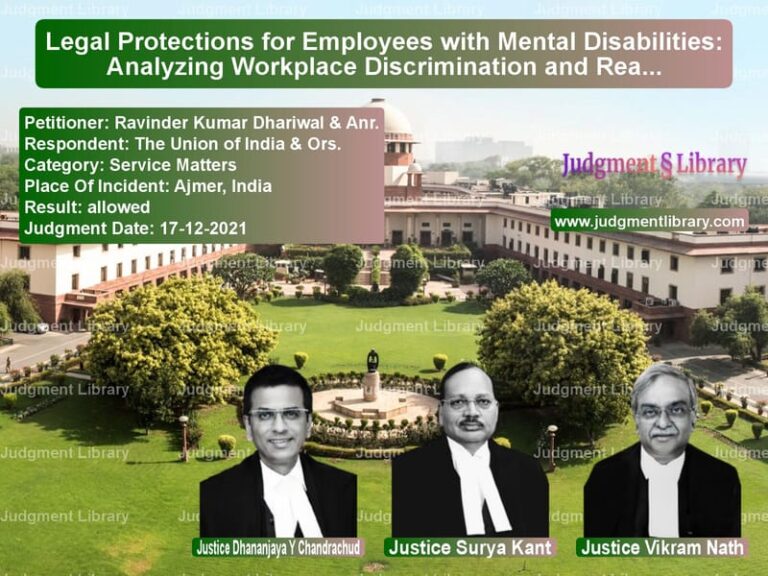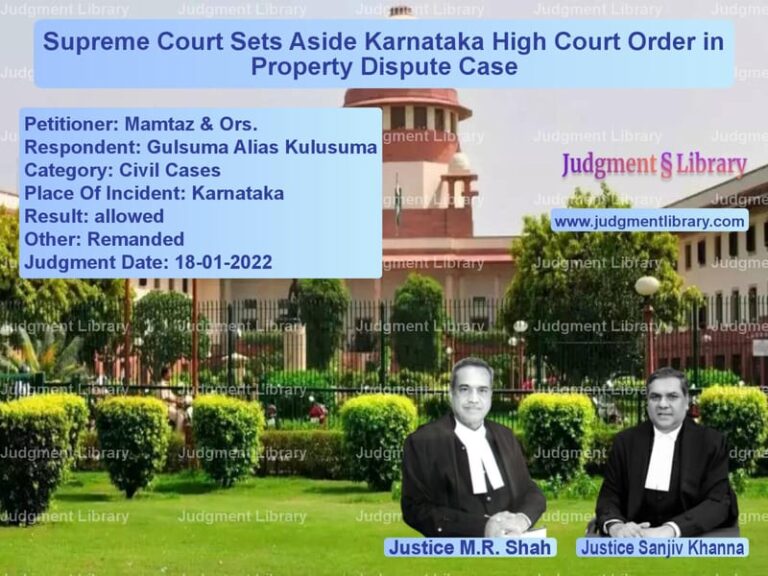Supreme Court Declares Assam Parliamentary Secretaries Act Unconstitutional
The Supreme Court in the case of Bimolangshu Roy (Dead) Through LRs vs. State of Assam & Another declared the Assam Parliamentary Secretaries (Appointment, Salaries, Allowances and Miscellaneous Provisions) Act, 2004 (hereinafter referred to as ‘THE ACT’) unconstitutional. The judgment, delivered on July 26, 2017, held that the Assam legislature lacked the competence to enact THE ACT.
Background of the Case
The Assam Parliamentary Secretaries Act, 2004, was passed to appoint members of the Legislative Assembly as Parliamentary Secretaries with the rank and status of Ministers of State. This move came after the 91st Constitutional Amendment restricted the number of ministers in a state government to 15% of the total strength of the Assembly.
The Act allowed the Chief Minister of Assam to appoint Parliamentary Secretaries who were assigned responsibilities similar to ministers, circumventing the constitutional restriction. The Act was challenged as being unconstitutional and violating Article 164(1A) of the Constitution.
Key Legal Issues Considered
- Whether the Assam legislature had the competence to enact THE ACT.
- Whether the appointment of Parliamentary Secretaries violated Article 164(1A), which limits the number of ministers.
- Whether THE ACT undermined the principle of a responsible government and the constitutional framework.
- Whether the basic structure doctrine applied to strike down the Act.
Petitioner’s (Appellant’s) Arguments
The petitioners argued:
- THE ACT was an attempt to circumvent the 91st Constitutional Amendment, which capped the size of the Council of Ministers at 15% of the Assembly’s strength.
- The Assam legislature lacked competence to enact the law since the Constitution explicitly provided for the structure of the executive.
- By giving Parliamentary Secretaries the rank and status of Ministers of State, THE ACT effectively violated Article 164(1A).
- THE ACT was a fraud on the Constitution and violated the principle of a responsible government, which is a part of the basic structure of the Constitution.
Respondent’s (State of Assam) Arguments
The respondents contended:
- The Assam legislature was competent to enact THE ACT under Entry 39 of the State List (powers, privileges, and immunities of Legislative Assemblies and their members).
- Parliamentary Secretaries did not have the same powers as Ministers and were merely assistants, ensuring that the cap on ministerial appointments was not breached.
- The doctrine of the basic structure applied only to constitutional amendments, not ordinary legislation.
Supreme Court’s Analysis and Judgment
The Supreme Court, comprising Justices J. Chelameswar, R.K. Agrawal, and Abhay Manohar Sapre, held THE ACT unconstitutional. The key findings were:
1. Assam Legislature Lacked Competence to Enact THE ACT
The Court held that the creation of new executive offices beyond the Council of Ministers was not within the legislative competence of the Assam legislature:
“The Constitution, under Articles 74, 75, 163, and 164, creates the executive structure and does not permit the State Legislature to expand it by enacting new offices of political executive.”
2. THE ACT Violated Article 164(1A)
The judgment stated that the cap on the number of ministers was imposed by a constitutional amendment and could not be circumvented by appointing individuals with similar ranks and functions:
“The very object of Article 164(1A) is to limit the size of the Council of Ministers. The Act, by appointing Parliamentary Secretaries with the status of Ministers of State, defeats this purpose.”
3. Responsible Government and Constitutional Violation
The Supreme Court noted that the Act undermined the principle of responsible government:
“The Chief Minister cannot appoint individuals to exercise executive powers without accountability to the legislature. Such appointments disrupt the scheme of responsible governance enshrined in the Constitution.”
4. Doctrine of Basic Structure
Although the respondents argued that the doctrine applied only to constitutional amendments, the Court held that ordinary legislation could be struck down if it violated core constitutional principles:
“The legislative competence of the State does not extend to nullifying the constitutional mandate. THE ACT, by violating constitutional limitations, is an attempt to overreach the Constitution and is liable to be struck down.”
Final Orders of the Supreme Court
- The Supreme Court declared THE ACT unconstitutional and struck it down.
- All appointments made under THE ACT were held to be void.
- The Assam government was directed to remove all individuals appointed as Parliamentary Secretaries under THE ACT.
Legal Implications
1. Limits on State Legislative Power
The judgment clarifies that state legislatures cannot create new executive offices beyond what is prescribed by the Constitution.
2. Strengthening the 91st Constitutional Amendment
The ruling reinforces the limitation on the size of the Council of Ministers, ensuring that states do not bypass the restriction through alternative mechanisms.
3. Ensuring Responsible Government
The decision affirms that executive appointments must align with constitutional provisions and be accountable to the legislature.
Conclusion
The Supreme Court’s ruling in Bimolangshu Roy vs. State of Assam is a landmark decision that upholds constitutional integrity. By striking down THE ACT, the Court has reinforced the fundamental principles of responsible government and ensured that state legislatures do not bypass constitutional limitations.
Don’t miss out on the full details! Download the complete judgment in PDF format below and gain valuable insights instantly!
Download Judgment: Bimolangshu Roy (Dea vs State of Assam & Ano Supreme Court of India Judgment Dated 26-07-2017.pdf
Direct Downlaod Judgment: Direct downlaod this Judgment
See all petitions in Constitution Interpretation
See all petitions in Legislative Powers
See all petitions in Separation of Powers
See all petitions in Judgment by J. Chelameswar
See all petitions in Judgment by R K Agrawal
See all petitions in Judgment by Abhay Manohar Sapre
See all petitions in allowed
See all petitions in Quashed
See all petitions in supreme court of India judgments July 2017
See all petitions in 2017 judgments
See all posts in Constitutional Cases Category
See all allowed petitions in Constitutional Cases Category
See all Dismissed petitions in Constitutional Cases Category
See all partially allowed petitions in Constitutional Cases Category

